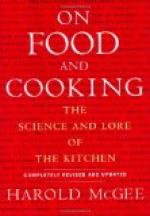GENERAL SUGGESTIONS.
In the preparation of desserts, as in that of all other foods it is essential that all material used shall be thoroughly good of its kind. If bread is to be used, the crumbs should be dry and rather stale, but on no account use that which is sour or moldy. Some housekeepers imagine that if their bread happens to spoil and become sour, although it is hardly palatable enough for the table, it may be advantageously used to make puddings. It is indeed quite possible to combine sour bread with other ingredients so as to make a pudding agreeable to the palate; but disguising sour bread makes sweets and flavors by no means changes it into a wholesome food. It is better economy to throw sour bread away at once than to impose it upon the digestive organs at the risk of health and strength.
Bread which has begun to show appearance of mold should never be used; for mold is a poison, and very serious illness has resulted from the eating of puddings made from moldy bread.
Eggs, to be used for desserts, should always be fresh and good. Cooks often imagine that an egg too stale to be eaten in any other way will do very well for use in cakes and puddings, because it can be disguised so as not to be apparent to the taste; but stale eggs are unfit for food, either alone or in combination with other ingredients. Their use is often the occasion of serious disturbances of the digestive organs. Most desserts in which eggs are used will be much lighter if the yolks and whites are beaten separately. If in winter, and eggs are scarce, fewer may be used, and two tablespoonfuls of dry snow for each omitted egg stirred in the last thing before baking.
Milk, likewise, should always be sweet and fresh. If it is to be heated, use a double boiler, so that there will be no danger of scorching. If fresh milk is not available, the condensed milk found at the grocer’s is an excellent substitute. Dissolve according to directions, and follow the recipe the same as with fresh milk, omitting one half or two thirds the given amount of sugar.
If dried sweet fruits, raisins, or currants are to be used, look them over carefully, put them in a colander, and placing it in a pan of warm water, allow the currants to remain until plump. This will loosen the dirt which, while they are shriveled, sticks in the creases, and they may then be washed by dipping the colander in and out of clean water until they are free from sediment; rinse in two waters, then spread upon a cloth, and let them get perfectly dry before using.




